 |
Catholic Virtues
The Military Virtues Every Catholic
Must Have
Plinio Corrêa de Oliveira
You know that Louis Veuillot was a great Catholic journalist of the 19th century in France. At that time the counter-revolutionary movement had many intellectuals who unfortunately were making various concessions to the Revolution. Veuiilot was perhaps the one who held the purest position among those ultramontaine Catholics. In 1913, when the centenary of his birth was commemorated, St. Pius X delivered a magnificent eulogy of Veuillot, one of the highest tributes a Catholic can receive from a Pope.
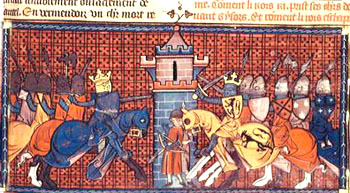
As members of the Church militant we are born to fight those outside and inside her walls |
Among his many literary productions, Veuillot wrote the book War and the Man of War [La guerre et l’homme de guerre]. I have here an excerpt from this book that I will read and then make some commentaries.
Let me remind you that we cannot lose sight of the fact that the Church exists on this earth to fight and that her normal relations with those both outside and inside her walls is one always characterized by combat. Outside she has her adversaries, the heretics, schismatics, pagans and Jews. Inside, she has a twofold struggle: first, every Catholic must fight his own defects and the Church must encourage and help him to do so; second, she has to fight those who promote the work of the anti-Church within her walls. We assume these battle obligations because we are members of the Church Militant.
Thus, everything that is related to the military condition can be transposed to the Catholic life. For this reason we will comment on this text by Veuillot:
Every man is born a soldier, although not every soldier will use his arms. Those who combat, however, are privileged in the eyes of the God of Hosts, who rejoices in passing in review before his warriors. Each one who bears weapons assumes responsibility for the physical safety of his fellow citizens, for the life and the liberty of his brothers.
He takes up the sword and the shield for those who lack them and for those who are too weak to bear and use them. And God says to him, as He said to Gideon, Joshua and other chiefs of His people: “These are my orders: Be valiant; fear no enemy that appears before you no matter how strong and many are his forces. I am with you. I will come to your succor and judge you by your courage.” This is the command of God, the first principle behind the duty of every soldier and the firmest validation of his value.
It is a very beautiful text, beginning with the first play of thoughts: Every man is born a soldier, although not every soldier will use his arms. Yes, all men are born soldiers because, as the Scripture states, Militia est vita hominis super terram [The life of man upon earth is a warfare] (Job 7:1). Our life is a fight, and this is how we must consider it first and foremost.
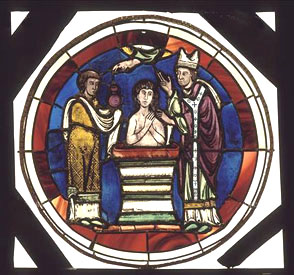
Baptism scene from Sainte Chapelle Chapel in Paris |
A man is born a soldier at the first moment he sees the natural light. Then when he is baptized, he receives the light of grace and is born a second time, now to the supernatural life, becoming a soldier in its defense. Further, the Church has a special Sacrament that confirms a man as a soldier in the full sense of the word. It is the sacrament of Confirmation or Chrism. By arming us as knights, it confers on us the military vocation, the vocation to fight for the Church.
Veuillot asserts that not every soldier uses his weapons on the battlefield, but that whoever does so is privileged. I agree with this statement. Since the duty of the soldier is to fight, when he takes up arms to enter battle he becomes privileged. Imagine a painter who does not paint, a musician who cannot make music, a singer who cannot sing, a professor who is unable to give classes, a diplomat prevented from engaging in politics. Certainly they are unhappy men. They have all the skills to exercise this or that activity, but their talents are unused and inoperative. The same applies to the soldier. He has a military capacity that cannot be fulfilled unless he enters into battle. Then, he becomes privileged; he fulfills his vocation.
Woe to the country whose soldiers are sad and discontent when they enter battle! The soldier should be joyful when war comes so that he can fight. Of course, at the base of every war is a sin, and the soldier cannot desire the sin. The war also generally gives occasion for many other sins: killing civilians, useless bombing, crimes against private propriety, honor, etc. Even in a just war these sins occur, and no one can desire them. But when a war becomes necessary, the soldier is joyful because he can exercise his talents.
Someone could object: This is absurd! How could a person be happy amidst such outrages?
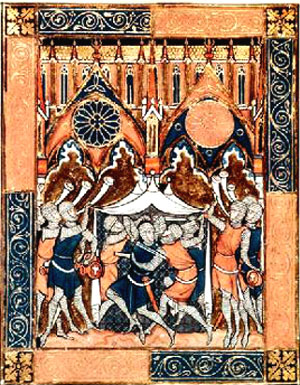
On God's orders, Gideon's army sounding its trumpets and attacking the Midianite camp |
I would answer: No, this is not absurd, but the normal way of life. A physician should not desire illnesses; nonetheless, he is unhappy when there are no sick persons for him to cure. A doctor without any patients is an unhappy man. His genius and skills are all turned toward curing people. For different reasons he is happy when there is no illness, but at the same time in such circumstance he cannot exercise his genius and talents. There is no contraction here. It is the natural way human affairs operate. The same applies to the soldier.
We who are militants of the Church of God should not take the cowardly stance: “What a relief that God gave me such a peaceful life! How blessed it is that I have never had the opportunity to fight for Him!” If one entertains this thought, he betrays his mission. Because in the service of God there is always the fight. If a man did not take it up, it is because he refused to see the adversary or fled from him in the hour of assault. Thus he betrayed his duty.
The mark of the Catholic is to fight and to love the fight. Sometimes I see persons distressed because they are in a spiritual turmoil, tempted or in a spiritual desert. They think something extraordinary has happened to them. I believe they are wrong.
While we are on this earth, it is normal that we be tempted once in a while. Temptation can come even without any fault on our part, in order to form us and make us progress. We should face the temptation with trust in Our Lady, with piety, vigilance and joy. We are joyful because we are proving our fidelity to Our Lady. I remember hearing this eulogy of a Saint - I have forgotten his name - read during his Mass: “He could have done evil, but he did not.” We should do the same. We should choose virtue even when everything around us steers us to enjoy life.
The purity of an ugly woman who has no charm and is rejected by every man is certainly a precious virtue before the eyes of God. But the purity of a woman to whom God gave beauty and charm is still more precious before God, because she easily could have done evil but she did not; she practiced the virtue of purity as if she were the homeliest woman.
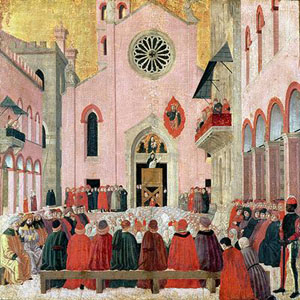
St. Vincent Ferrer always attracted multitudes.
Above, preaching in Verona
|
Once St. Vincent Ferrer went to preach in Barcelona - he was a great preacher in the 15th century and Barcelona was at its height of prestige and brilliance. The city gave him a superb reception. From all the windows tapestries were hung to render him homage; people acclaimed and cheered him as he passed; he processed the streets under a canopy carried by the highest personages of the city. As he walked along, he remained recollected and in prayer.
At a certain moment, someone approached him and whispered in his ear: “Are you never tempted to vanity, Br. Vincent?” He looked around him at all that glory and answered: “It flies around me but does not enter.”
He did not assume an arrogant position: “I don’t even feel a temptation to vanity.” Nor did he take a stupid, sentimental one: “Poor me, I am a bottomless well of vanity.” Instead, he answered appropriately, “It flies around me but, by the grace of God, it does not enter my soul.” This answer translates: “I am a man; the temptation is strong and I am being tempted right now. But, assisted by grace, I am not making concessions to it, so it does not enter my soul.” He could have enjoyed that glory, but he did not. Such a position has a special worth.
Thus, it is normal to be tempted. It is not normal to be surprised or depressed by a temptation. As a rule we receive temptations. God allows them to temper our souls. The soul that says “no” to the Devil leaves the fight stronger and more dependent on Our Lady. The good servant uses his talents in this fight, and delivers the booty from the battle to his Lady. Therefore, being soldiers, being militants, we should be enthused with the fight.
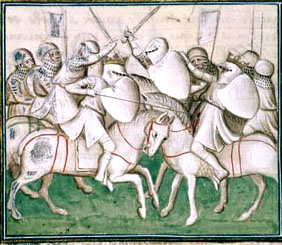
The Catholic must have a great love for the fight and the militant spirit |
It is also normal for us – as counter-revolutionaries – to be attacked by our enemies. Sometimes I see a person who is astonished to see that we received this blow from the Communists, that calumny from the false right, or that ambush coming from a progressivist ecclesiastical authority. There is nothing extraordinary in these attacks. They come because we are counter-revolutionaries and confirm that we are on the right path.
They fulfill the prophecy God made in Paradise when speaking to the serpent: “I will put enmities between you and the woman, between your seed and her seed: And she shall crush your head” (Gen 3:15). As a consequence, the sons of Our Lady will battle against the sons of the serpent to the last day of the world. If we were not attacked, we would not be her sons.
The result is that the better and more faithful we are, the more we will be attacked. Thus, the good soldier should not be surprised to be assaulted; it is normal. Instead, if we are not being attacked we might ask these questions: Is it because we are making concessions to the Revolution? Shouldn’t we be more strongly attacked? Are we doing all that we should be doing?
We should have a greater love for the fight and the militant spirit. We should have the innocence of the dove in our aims and in the legitimacy of our methods. But we should also have the astuteness of the serpent in executing our good objectives and adopting intelligent plans to attack the adversary at every legitimate opportunity.

This talk was translated from the transcript of the tape
and slightly adapted by Atila S. Guimarães
Posted January 26, 2009

Related Topics of Interest
 Defining the Left and the Right Defining the Left and the Right
 The Role of Loyalty in Catholic Life The Role of Loyalty in Catholic Life
 King Henry II - Emperor, General and Saint King Henry II - Emperor, General and Saint
 Catholic Moral Criteria for a Just War Catholic Moral Criteria for a Just War
 Just War Supported by Scriptures Just War Supported by Scriptures
 St. Vincent Ferrer, the Angel of the Apocalypse St. Vincent Ferrer, the Angel of the Apocalypse

Related Works of Interest
|
|
Catholic Virtues | Religious | Home | Books | CDs | Search | Contact Us | Donate

© 2002- Tradition in Action, Inc. All Rights Reserved
|
 |
|